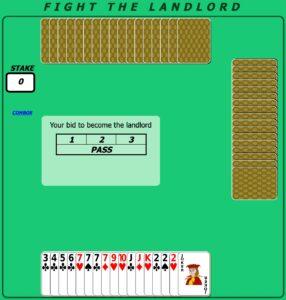Introduction
I played Dou Di Zhu, whose literal translation is “Fighting the Landlord.” This game originated in the 90s in Hubei Province, China, and has gained immense popularity over the past three decades. The name derives from the Land Reform Movement that occurred in China during the 50s, where the Communist Government encouraged peasants to seize land from landlords. Similarly, in the game, players assume the role of either a peasant or a landlord. I’ve played this game for years and have also watched people play it on television. Recently, I played it again online.
Argument
Dou Di Zhu can be highly addictive due to its straightforward mechanics and engaging role-playing elements. Unlike other card games that rely heavily on chance or probability, Dou Di Zhu introduces a strategic dimension where players must either cooperate as peasants or outmaneuver all peasants as the landlord. Usually, when the players get a bad hand, they can still win by cooperating with the other peasants. This dual aspect of cooperation and competition makes the game compelling and can hook players into prolonged sessions.
Risk of Addiction
The simplicity of Dou Di Zhu is a double-edged sword. While it makes the game accessible to a wide audience, it also lowers the barrier to entry, making it easier for players to become quickly absorbed. The game’s structure involves relatively few rules about the hands of cards that can be played. The low skill requirement allows for quick gratification and can be particularly appealing and addictive. Players can experience frequent wins, and also long streaks of losing. For example, I was able to win a long streak as peasants and landlords but when I got a bad hand.
Comparison to Other Games
When comparing Dou Di Zhu to other games of chance or probability, several differences stand out. It originates from a card game called Zheng Shang You. Even though they have similar mechanics, this game has more rules and is harder to learn. Other traditional card games like Poker or Blackjack require a higher level of skill and strategic thinking, which are a deterrent to novice players. These games often have more complex rules and a steeper learning curve. In contrast, Dou Di Zhu’s simplicity ensures that players spend less time learning the game and more time playing it.
Engagement with Probability and Randomness
Dou Di Zhu integrates aspects of probability and randomness in a manner that feeds into the addictive nature of the game. Each round begins with the distribution of cards, which is inherently random. However, the rules are that if you are confident with your hand, you can ask for three more cards if you successfully get the landlord position. This balance of chance and strategy keeps players coming back, seeking to improve their skills and test their luck.
Overall, the game’s low skill requirement allows for immediate enjoyment and frequent gratification, while the strategic depth keeps players mentally invested. As a result, Dou Di Zhu can easily become a game that players find hard to put down, continuously drawing them back for more.
 This is the game interface I played on. The players can choose the bid based on their randomized hand and become the landlord or the peasant.
This is the game interface I played on. The players can choose the bid based on their randomized hand and become the landlord or the peasant.


